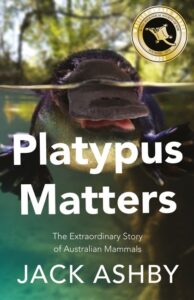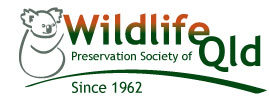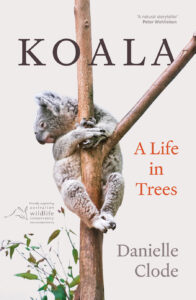Some native plants of Arcadia, Magnetic Island (Yunbenum) Arcadia Coast Care, 2022, $20.
In this top-quality guide, subtitled “a self-guided walk”, you’ll find an abundance of information to help you explore Arcadia’s foreshores and reserves. It covers more than 60 native plants in easily accessible locations and uniquely links many insects to their host plants. Written in an entertaining yet informative style, in full colour and fully indexed, this is a rich resource for residents and visitors alike.
The book was launched on Magnetic Island on 6 November. Mainlanders can obtain copies from Mary Who Bookshop in Flinders Street. All proceeds to Magnetic Island Nature Care Association.
Koala: a life in trees by Danielle Clode. Black Inc, 2022. $34.99
Danielle Clode is a biologist, a historian and a damn good writer. She has been described as a “master at making the complex, understandable” and in her latest book, she has chosen as her subject perhaps Australia’s most endearing, but in some ways, its most complex and mysterious mammal. Clode explores the koalas’ history from their megafaunal ancestors, to their place in First Nations culture while noting their somewhat belated ‘discovery’ by Europeans (“more interested in what lay beneath their feet than what was sitting above their heads, watching them pass”) and the scant attention paid to these unique Australians in the early decades post-settlement. She also records the horrific statistics of the slaughter that raged for decades, fuelled by the American fur trade, and only stopped by the actions of President Hoover.
Clode delves into the contradictions and complexities of koala physiology, diet and behaviour; she explores the evolution and impact of koala viruses and retroviruses (not all of them bad) and how populations have fared in past fires, pre- and post-settlement, with a special focus on the holocaust of 2019-20. Finally, she maps out what it might take to give these Aussie battlers and survivors their best chance of a future. I found this book as enthralling as its subject, often reading into the small hours and picking it up again as soon as I woke up. If you need an added incentive to buy a copy for yourself or a friend, note that a portion of the proceeds supports the work of the Australian Wildlife Conservancy.
Platypus matters: the extraordinary story of Australian mammals by Jack Ashby. Collins, 2022. $34.99.

If you were among those who heard Richard Fidler’s Radio National interview with Cambridge museum director Jack Ashby, a few months ago, you might have wondered, “Why is a Pom writing a book about our platypus?” Good question. As Ashby points out, so-called western science has had an unfortunate habit of regarding Australian fauna as weird, inferior or, more bluntly, as just “primitive” curiosities. Monotremes, like the platypus, were especially shocking to the European mind. For one thing they broke the “rules” of Western science and for a time were not even considered mammals at all. Fortunately Ashby takes a very different view and he openly acknowledges that for him platypuses are not only “an evolutionary biologist’s dream” but “the most amazing animals on earth”, happily providing ample evidence to support his claim. However much you already know about platypuses (and most of us probably know less than we think) the first chapter alone will fill you with awe for this animal.
But, as the sub-title indicates, Ashby does not confine his book to the platypus, or even to just the two monotremes. He is thrilled and excited by practically all of Australia’s wildlife and particularly so by the remarkable evolution and exceptional diversity of Australia’s mammals, pointing out how privileged we are to have all three types of mammal (marsupial, monotreme and placental) native to our country. And, while often injecting humour into his writing, Ashby has a serious purpose. He believes the disparaging attitude towards our mammals, so often perhaps unconsciously reflected in the language used to describe them, has had a negative effect on their conservation and may be at least partly responsible for the nation’s appalling record of mammal extinctions. If this is to change, Australians and the world at large need to view, value and talk about our mammals with the importance they deserve. Click on the link above if you would like to hear Jack Ashby in person – and perhaps consider his suggestion for what to call a baby platypus. I do think “platypup” has a certain ring ….doesn’t it?
And how can I not mention Wildlife Queensland’s Christmas Appeal which will enable the Society’s important Platypus Watch project to continue – click here for details.






